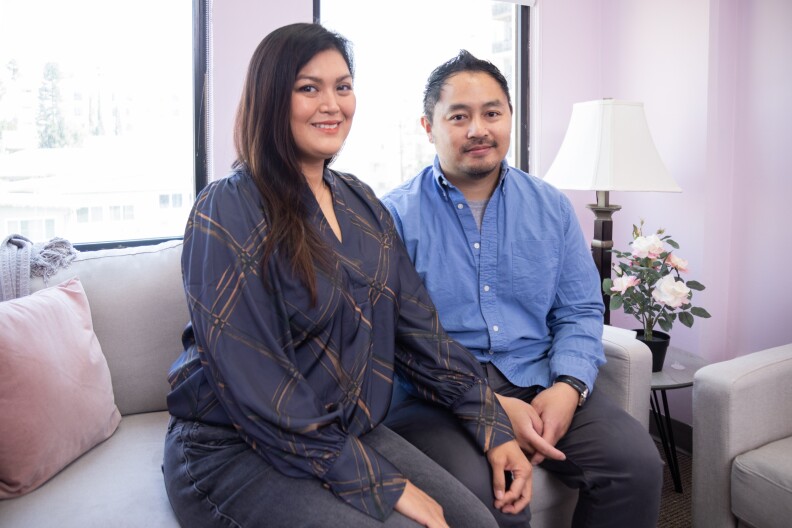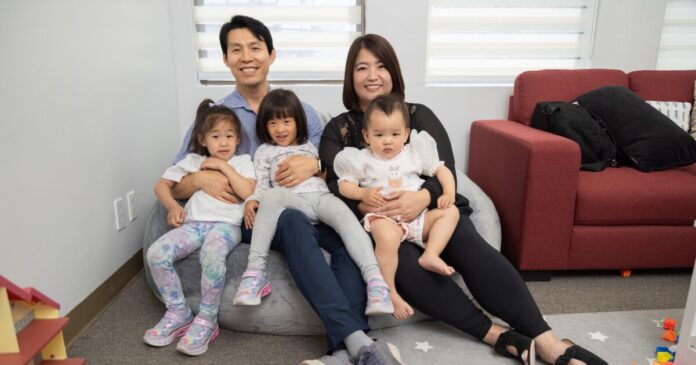Ivy Chou remembers the frightened face of the first foster child to live with her. The 3-year-old child of Chinese immigrants only knew Mandarin, which Chou quickly deployed when they met.
“As soon as I started speaking Mandarin, the child thought that I was the parents’ friend and immediately felt safe, I think,” Chou said.
It wasn’t just a common language that put the child at ease. At Chou’s place in Los Alamitos, shoes come off indoors. Chou, who is Taiwanese American, could cook Asian dishes. Soon the foster child was asking for certain foods.
“The request was for chicken noodle, Asian-style,” Chou recalled, laughing at the specificity of the order. “And also the child actually wanted dragon fruit.”
Chou is part of an in-demand cohort in Southern California: Asian American foster parents with the cultural know-how to care for Asian American children.
Their ranks have grown to several hundred across Los Angeles and Orange counties, according to child welfare officials. But more are being recruited to match with hundreds of Asian American children in foster care who hail from different ethnic backgrounds and who speak an array of languages, Mandarin being the most common.
The country’s first foster and adoption agency focused on Asian American families — Korean American Family Services in Koreatown — provides training and ongoing support to scores of foster parents like Chou. But the pandemic changed life and financial circumstances for some of their families, and the number of foster households available has dropped below 30. The agency’s now pushing to double its current roster to about 70.
Katherine Yeom, the group’s executive director, said the trauma of entering foster care is that much worse for some of the children being placed in deeply unfamiliar settings.
“They felt like they were just out of place,” Yeom said. “They didn’t want to eat anymore, and they were having behavioral issues.”
-
Interested in becoming a foster parent in Southern California?
We asked about the experiences of several foster parents who trained through KFAM, which provides in-language workshops in Korean, Mandarin, Cantonese, Tagalog and Vietnamese.
The parents come from a range of backgrounds. What they all share is a love of kids, and the desire to provide comfort through a tough time, where they’ve been taken from everyone and everything they’ve ever known.
Ivy Chou
Ivy Chou of Los Alamitos became a foster parent last year and is currently caring for an infant.
About 20 years ago, Ivy Chou worked as a costume designer on a play in L.A. about a mother and child caught up in the child welfare system. Moved by the harrowing story, she vowed to foster or adopt when she got older and married.
Years passed, she said, and “at one point, I was like, ‘OK, I don’t think I’m getting married. Should I go ahead with kids?'”
Her cousin, who had recently adopted a sibling pair he and his wife had fostered, encouraged her to connect with KFAM. After going through 40 hours of training, background checks and visits by social workers, Chou started fostering last December with a big assist from her widowed mother, who lives with her in Los Alamitos.
The first child, who only spoke Mandarin, stayed for six days. Then an infant came to Chou in February. The child is recovering from injuries and needs regular physical and occupational therapy.
Like many of the foster parents, Chou is able to keep working — these days it’s a remote job in hospitality management — while receiving a monthly payment for the child’s expenses. The base rate is about $1,000 and goes up based on the intensiveness of the child’s needs.
How long the baby will stay with Chou is unknown. The child could be returned to the parents — reunification is the overriding goal — or they could relinquish their parental rights. Chou said she tries to stay in the moment and focus on what the child needs now.
“It’s been challenging, for sure, but so worth it,” Chou said. “You are the world to the baby.”
Romilline and Peter

Foster parents Romilline and Peter Santa Maria.
When Sylmar couple Peter and Romilline Santa Maria encountered difficulty starting a family, neither fostering nor adoption came up as alternatives in their circle of family and friends.
“It’s just not talked about a lot in a lot of Asian households,” said Peter Santa Maria, an accountant.
“The Asian household is always very proud of family,” said Romilline Santa Maria, a nurse who was born in the Philippines. “And if you’re unable to reproduce, they always see that as a kind of a failure for the most part, especially the older generations.”
The Santa Marias say it’s different with millennials like them. Since signing up for a training through KFAM more than two years ago, the couple have fostered four children: one baby and three teenagers.
-
Foster parent eligibility checklist:
- I have enough room in my house for another child
- I have adequate income to meet my current family’s needs
- I am able to meet the physical demands of being a parent
- I have never received supervision for child abuse or neglect
- I have never been out of compliance for child support payments
- No one in my home has been convicted of crimes against children or domestic violence
- I currently live in a home where I intend to foster or adopt, and this home is safe for children
- I am willing to meet the needs of a child that is placed in my care
Source: Korean American Family Services
None of the children have been Filipino American, but there’s cultural overlap.
With them now is a teen of Vietnamese and Cambodian descent who had requested an Asian foster family. They’ve discovered a shared fondness for jackfruit and similarities in their respective languages, like how to say soap.
“What these kids want is just to be able to live a normal life, and then having that similar background, it does help a lot,” Peter said.
The couple hope to one day adopt. Until then, they know that part of the job of a foster parent means having to say goodbye to children they come to care deeply for when they return to family.
“Part of that is acceptance and just really understanding that not every story is meant to end with you,” Romilline said.
Junho and Christine

Junho Im and Christine Chang first fostered siblings Kayla and Rayna when they were newborns. They have since adopted them.
While growing up in Taiwan, Christine Chang went on a third-grade field trip with her class to donate items at an orphanage.
“It really, really touched my heart,” Chang said. “So I really remember that.”
Decades later, living in Brea and working as an insurance agent, Chang and her husband Junho Im were struggling to have children. She had undergone fertility treatments and experienced a miscarriage. The surrogate the couple hired also miscarried.
One day the Korean-born Im was listening to Korean-language radio when an ad about KFAM’s foster care initiative came on. He attended a training session in Korean, and the next time brought Chang with him to an English-language session.
They became foster parents in 2019, and have since cared for four children..
One of them, a 2-year-old, stayed with them as the child’s Chinese-born parents dealt with immigration authorities. But the problems resolved within three months and the child returned home.
“The moment she saw her dad, she looks so happy,” Chang said.
Chang was still missing the child when she got a call in 2020 to take in twin infant girls who were born to Chinese parents.
The twins, Kayla and Rayna, are now 4 and here to stay. The couple adopted them this year after their birth parents relinquished their rights. While the adoptions were pending, the couple’s surrogate became pregnant. Chang and her husband now have three daughters.
“We’re so excited, and so glad that our dream came true,” Chang said.
Another happy surprise: the child who returned to her parents after they ironed out their immigration issues is now back in her life. Her family lives nearby and a few months ago, her parents reached out to meet up. They’ve since become friends.
Chang said she couldn’t have expected any of this. It’s a story, she said, she now tells to as many people as possible.
Rosie and Dominic

Foster parents Rosie Chin and Dominic Buenaventura.
Several years ago, newlyweds Rosie and Dominic were volunteering their time with foster children through their church in the South Bay.
Rosie, a project manager in the biotech industry, had been thinking about becoming a foster parent for years. Dominic, a civil engineer, had already raised four children of his own, all now adults. But hanging out with the foster children, Dominic said, “I just fell in love with it. My heart, you know, bled for them.”
The couple, who asked that their last names not be used for privacy reasons, started fostering for the first time this year, welcoming a pair of teenage siblings. The couple had originally requested elementary school-aged children.
“We thought teenagers are not easy,” Rosie said. “We prayed about it, and we just thought that if God calls us to take care of these two kids, then we will.”
The siblings are of Chinese descent, like Rosie, and speak with each other in Mandarin, which Rosie can understand. Dominic, who is Filipino American, cannot, but there’s no issue communicating with the siblings who have lived in the U.S. since they were young and are fluent in English.
The couple smile broadly recounting a trip to Disneyland with the siblings and how much they enjoy dinnertime when they discuss the day’s events over homemade meals like a “chunky fried rice” dish they make with lots of veggies and morsels of meat — one of the teens’ favorite.
It’s been four months with the siblings and the couple sound excited about the road ahead.
“They’re getting to know us,” Dominic said. “We’re getting to know them at the same time. We’re trying to just get it right.”
Have a question about Southern California’s Asian American communities?
Josie Huang reports on the intersection of being Asian and American and the impact of those growing communities in Southern California.

